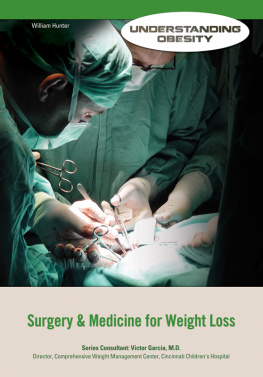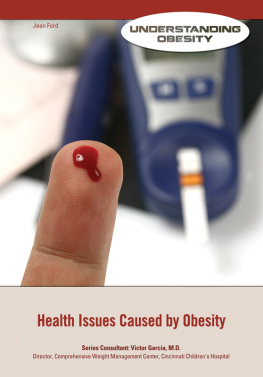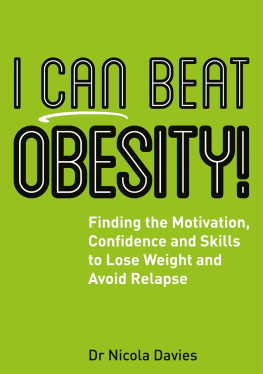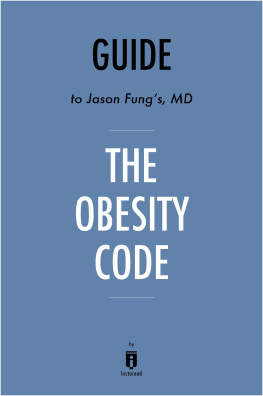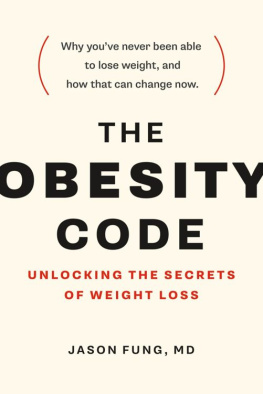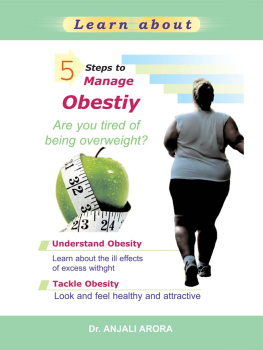Introduction
I want to thank you and congratulate you for downloading the book, The Ultimate Guide to Tackling Obesity How to Overcome Obesity and Lose Weight .
This book contains proven steps and strategies on how to tackle obesity, and why it is so important.
Obesity can be the result of many factors, however this book is designed to help you recognize these and work towards ridding them from your life. It is all too easy for people to see an obese person and think that they must eat too much and even think how can they let themselves get that way? Whilst many cases of obesity are self inflicted there are other cases that cannot be helped. The book aims to cover everything from exactly what obesity is, how it is caused and how there are steps that can be taken to overcome it.
One thing before we get into the book, if you would be interested in getting more free kindle books from me then I suggest you visit this link here: http://bit.ly/1Bxtqqs
The topics covered are:
- What is obesity?
- What are the causes of obesity?
- Are you ready to make the changes?
- Weigh t loss programs
- Key weigh t loss questions
- Why lose weight?
Thanks again for downloading this book, I hope you enjoy it and can learn from it how to begin tackling obesity in your life!
Copyright 2014 by James Wigglesworth - All rights reserved.
This document is geared towards providing exact and reliable information in regards to the topic and issue covered. The publication is sold with the idea that the publisher is not required to render accounting, officially permitted, or otherwise, qualified services. If advice is necessary, legal or professional, a practiced individual in the profession should be ordered.
- From a Declaration of Principles which was accepted and approved equally by a Committee of the American Bar Association and a Committee of Publishers and Associations.
In no way is it legal to reproduce, duplicate, or transmit any part of this document in either electronic means or in printed format. Recording of this publication is strictly prohibited and any storage of this document is not allowed unless with written permission from the publisher. All rights reserved.
The information provided herein is stated to be truthful and consistent, in that any liability, in terms of inattention or otherwise, by any usage or abuse of any policies, processes, or directions contained within is the solitary and utter responsibility of the recipient reader. Under no circumstances will any legal responsibility or blame be held against the publisher for any reparation, damages, or monetary loss due to the information herein, either directly or indirectly.
Respective authors own all copyrights not held by the publisher.
The information herein is offered for informational purposes solely, and is universal as so. The presentation of the information is without contract or any type of guarantee assurance.
The trademarks that are used are without any consent, and the publication of the trademark is without permission or backing by the trademark owner. All trademarks and brands within this book are for clarifying purposes only and are the owned by the owners themselves, not affiliated with this document.
Chapter 1 - What is Obesity?
Remember by visiting the link at the start and end of the book you can get access to other free kindle books and a free report on the 3 health foods to stop eating.
Obesity is a medical condition which sees fat accumulated on on e s body to the extent where it has a negative effect in the perso n s health, reducing their life expectancy and increasing their risk of health problems. People are considered obese if they have a BMI (Body Mass Index) of over 25. A perso n s BMI can be determined by dividing their weight by the square of their height.
Obesity increases the likelihood of a multitude of diseases, in particular heart conditions, type 2 diabetes, certain types of cancer and osteoarthritis. The most common causes of obesity are from a combination of eating to excess, lack of exercise, genetic susceptibility and they will be cases that are the result of genes, medication, endocrine disorders and psychiatric illness. Strangely enough obese people have greater energy expenditure than their thin counterparts due to the energy that is required to maintain their increased body mass.
The main treatments for obesity are diet and exercise. A perso n s diet can be improved by reducing the number of calories derived from foods that have a high fat and sugar content and by increasing the amount of fibrethat they consume. Once there is a suitable diet in place, ant i obesity medication can be taken to reduce the perso n s appetite or lower their fat absorption rate. If diet, medication and increased exercise are not effective there are also a number of surgical procedures that could be considered.
Obesity is one of the largest yet preventable causes of death worldwide with increasing rates year on year. It is thought of by authorities to be the most serious health problem this century. Although obesity is frowned upon there are still parts of the world where it is seen as a symbol of wealth.
As stated above, obesity is defined by the individuals BMI and this is further evaluated by the fat distribution around the waist and hips coupled with cardiovascular risk indicators.
When evaluating children, a healthy weight will be variable and determined by the chil d s age and sex.
BMI falls into the following classifications:
BMI | Classification |
Under 18.5 | Underweight |
24.99 | Normal Weight |
29.99 | Overweight |
34.99 | Class 1 Obesity |
39.99 | Class 2 Obesity |
40 + | Class 3 Obesity |
Health Effects from obesity
Excessive weight is associated with a variety of diseases and is also found to reduce life expectancy considerably. Research that has been carried out by the American and Europeans proves that the mortality level is at its lowest in individuals that have a BMI of 2 25 who are also non smokers. In the USA obesity is estimated to be the cause of up to 365,000 deaths a year, whilst over 7% of deaths in Europe are caused by excessive weight. Average statistics show that obesity reduces life expectancy by up to ten years.
Morbidity
Obesity also increases the risk of both mental and physical conditions. Complications are more often than not directly associated with obesity and those sufferers probably have a link such as a poor diet or sedentary lifestyle.
Health consequences can be defined by two broad categories:
- Those with effects that are caused by increased fat mass such as osteoarthritis, social stigmatization etc
- Those caused by the increased number of fat cells, such as diabetes, cancer and so on
When there is an increase in body fat this alters the way the body responds to insulin which can potentially result in insulin resistance.
Whilst the negative health consequences of obesity are well documented there have been cases when an increased BMI actually benefits the individual. It is proven that people tend to lose weight as their illness takes hold and in these cases there has been no conclusive evidence that those obese individuals have any further risks than individuals who are of an optimum weight when their illness took hold.






